- Home
- Diana Wynne Jones
Hexwood Page 2
Hexwood Read online
Page 2
The boy did not stop to think. Just beside his feet was a dead branch, overgrown and half-buried in the grass. He bent down and tore it loose. It came up trailing roots, falling to pieces, smelling of fungus. He flung it, trailing bits and all, into the animal’s open mouth. The mouth snapped on it, and could only shut halfway. The boy turned and ran and ran. He hardly knew where he went, except that he was careful to keep to the mud path.
He pelted round a corner and ran straight into the silver creature.
Clang.
It swayed and put out a silver hand to fend him off. “Careful!” it said in a loud flat voice.
“There’s a crawling thing with a huge mouth back there!” the boy said frantically.
“Still?” asked the silver creature. “It was killed. But maybe we have yet to kill it, since I see you are quite small just now.”
This meant nothing to the boy. He took a step back and stared at the silver being. It seemed to be made of bendable metal over a man-shaped frame. He could see ridges here and there in the metal as it moved, as if wires were pulling or stretching. Its face was made the same way, sort of rippling as it spoke – except for the eyes, which were fixed and reddish. The voice seemed to come from a hole under its chin. But now he looked at it closely, he saw it was not silver quite all over. There were places where the metal skin had been patched, and the patches were disguised with long strips of black and white trim, down the silver legs, round the silver waist and along the outside of each gleaming arm.
“What are you?” he asked.
“I am Yam,” said the being, “one of the early Yamaha robots, series nine, which were the best that were ever made.” It added, with pride in its flat voice, “I am worth a great deal.” Then it paused, and said, “If you do not know that, what else do you not know?”
“I don’t know anything,” said the boy. “What am I?”
“You are Hume,” said Yam. “That is short for human, which you are.”
“Oh,” said the boy. He discovered, by moving slightly, that he could see himself reflected in the robots shining front. He had fairish hair, grown longish, and he seemed to stand and move in a light, eager sort of way. The purple-blue clothes clung close to his skinny body from neck to ankles, without any sort of markings, and he had a pocket in each sleeve. Hume, he thought. He was not certain that was his name. And he hoped the shape of his face was caused by the robots curved front. Or did people’s cheekbones really stick out that way?
He looked up at Yam’s silver face. The robot was nearly two feet taller than he was. “How do you know?”
“I have a revolutionary brain and my memory is not yet full,” Yam answered. “This is why they stopped making my series. We lasted too long.”
“Yes, but,” said the boy – Hume, as he supposed he was, “I meant—”
“We must get out of this piece of wood,” said Yam. “If the reptile is alive, we have come to the wrong time and we must try again.”
Hume thought that was a good idea. He did not want to be anywhere near that scaly thing with the mouth. Yam swivelled himself around on the spot and began to stride back along the path. Hume trotted to keep up. “What have we got to try?” he asked.
“Another path,” said Yam.
“And why are we together?” Hume asked, trying again to understand. “Do we know one another? Do I belong to you or something?”
“Strictly speaking, robots are owned by humans,” Yam said. “These are hard questions to answer. You never paid for me, but I am not programmed to leave you alone. My understanding is that you need help.”
Hume trotted past a whole thicket of the airy pink blossoms, which reflected giddily all over Yam’s body. He tried again. “We know one another? You’ve met me before?”
“Many times,” said Yam.
This was encouraging. Even more encouraging, the path forked beyond the pink trees. Yam stopped with a suddenness that made Hume overshoot. He looked back to see Yam pointing a silver finger down the left fork. “This wood,” Yam told him, “is like human memory. It does not need to take events in their correct order. Do you wish to go to an earlier time and start from there?”
“Would I understand more if I did?” Hume asked.
“You might,” said Yam. “Both of us might.”
“Then it’s worth a try,” Hume agreed.
They went together down the left-hand fork.
Hexwood Farm housing estate had one row of shops, all on the same side of Wood Street, and Ann’s parents kept the greengrocer’s halfway down the row. Above the houses on the other side you could see the trees of Banners Wood. And at the end of this row were the tall stone walls and the ancient peeling gate of Hexwood Farm itself. All you could see of the farmhouse was one crumbling chimney that never smoked. It was hard to believe that anybody lived there, but in fact old Mr Craddock had lived there until a few months ago for as long as Ann could remember, keeping himself to himself, and snarling at any child who tried to get close enough to see what was inside the old black gate. “Set the dogs on you!” he used to say. “Set the dogs to bite your leg off!”
There were no dogs, but nobody dared pry into the farm all the same. There was something about the place.
Then, quite suddenly, Mr Craddock was not there and a young man was living there instead. This one called himself Harrison Scudamore and dyed the top of his hair orange. He stalked about with a well-filled wallet bulging the back of his jeans and behaved, as Ann’s dad said, as if he was a cut above the Lord Almighty. This was after young Harrison had stalked into the shop for half a pound of tomatoes and Dad had asked politely if Mr Scudamore was lodging with Mr Craddock.
“None of your business,” young Harrison said. He more or less threw the money at Dad and stalked out of the shop. But he turned in the doorway to add, “Craddock’s retired. I’m in charge now. You’d all better watch it.”
“Awful eyes he has,” Dad remarked, telling Anne and Martin the tale. “Like gooseberries.”
“A snail,” Mum said. “He made me think of a snail.”
Ann lay in bed and thought of young Harrison. She had one of those viruses that was puzzling the doctor, and there was not much to do except lie and think of something. Every so often, she got up out of sheer boredom. Once, she even went back to school. But it always ended with Ann grey and shaky and aching all over, tottering back to bed. And when her brother Martin had been to the library for her, and she had read all her own books, and then Martins – Martin’s were always either about dinosaurs or based on role-playing games – she had no energy to do anything but lie and think. Harrison was at least a new thing to think about. Everybody hated him. He had been rude to Mr Porter the butcher too. And he had told Mrs Price, who kept the newsagent’s at the end, to shut up and stop yakking on. “And I was only talking – politely, you know – the way I do with everyone,” Mrs Price said, almost tearfully. Harrison had kicked the pampered little dog that belonged to the boys who kept the wine shop, and one of them had cried. Everyone had some tale to tell.
Ann wondered why Harrison behaved like that From a project she dimly remembered doing at school, she knew the whole estate had once been lands belonging to Hexwood Farm. The farm stretched north as far as the chemical works and east beyond the motel. Banners Wood, in the middle, had once been huge, though it was hardly even a wood these days. You could see through it to the houses on the other side. It was just trees round a small muddy stream, and all the children played there. Ann knew every crisp packet under every tree root and almost every Coke ring embedded in its muddy paths.
But perhaps Harrison has inherited the farm and thinks he still owns it all, she thought. He did behave that way.
In fact, Ann’s real theory was quite different and much more interesting. That old farm was so secretive and yet so easy to get to from London that she was convinced it was really a hideout for gangsters. She was sure there was gold bullion or sacks and sacks of drugs – or both – stored in its cellar with young Ha
rrison to guard it. Harrison’s airs were because the drug barons paid him so much to guard their secrets.
What do you think about that? she asked her four imaginary people.
The Slave, as so often, was faint and far off. His masters overworked him terribly. He thought the theory very likely. Young Harrison was a menial giving himself airs – he knew the type.
The Prisoner considered. If Ann was right, he said, then young Harrison was behaving very stupidly, drawing attention to himself like this. Her first theory was better.
But I only thought of that to be fair-minded! Ann protested. What do you think, King?
Either could be right, said the King. Or both.
The Boy, when Ann consulted him, chose the gangster theory, because it was the most exciting.
Ann grinned. The Boy would think that. He was stuck on the edge of nowhere, being a sort of assistant to a man who had lived so long ago that people thought of him as a god. He felt out of things, born in the wrong time and place. He always wanted excitement. He said he could only get it through talking to Ann.
Ann was slightly worried about the Boy’s opinions. The Boy was always behaving as if he were real, instead of just an invention of Ann’s. She was a little ashamed of inventing these four people. They had come into her head from goodness knew where when she was quite small and she used to hold long conversations with them. These days she did not speak to them so often. In fact, she was quite worried that she might be mad, talking to invented people, particularly when they took on ideas of their own, like the Boy did. And she did wonder what it said about her – Ann – that all four of her inventions were unhappy in different ways. The Prisoner was always in jail, and he had been put there many centuries ago, so there was no chance of Ann helping him escape. The Slave would be put to death if he tried to escape. One of his fellow-slaves had tried it once. The Slave wouldn’t tell Ann quite what had happened to that slave, but she knew he had died of it. As for the King, he also lived in a far-off time and place, and spent a lot of his time having to do things that were quite intensely boring. Ann was so sorry for all of them that she had often to console herself by keeping firmly in mind the fact that they were not real.
The King spoke to Ann again. He had been thinking, he said, that while Ann was lying in bed she had an ideal opportunity to observe young Harrison’s comings and goings. She might find out something to support her theory. Can you see Hexwood Farm from where you are? he asked.
No, it’s down the street the other way, Ann explained. I’d have to turn my bed round, and I haven’t the strength just now.
No need, said the King. He knew all about spying. All you have to do is to put a mirror where you can see it from your bed, and turn it so it reflects the street and the farm. It’s a trick my own spies often use.
It really was an excellent idea. Ann got out of bed at once and tried to arrange her bedroom mirror. Of course it was wrong the first time, and the second. She lost count of the weak, grey, tottering journeys she made to give that mirror a turn, or a push, or a tip upwards. Then all she saw was ceiling. So off she tottered again. But after twenty minutes of what seemed desperately hard work, she collapsed on her pillows to see a perfect back-to-front view of the end of Wood Street and the decrepit black gate of Hexwood Farm. And there was young Harrison, with his tuft of orange hair, sauntering arrogantly back to the gate carrying his morning paper and his milk. No doubt he had been rude to Mrs Price again. He looked so satisfied.
Thank you! Aim said to the King.
You’re welcome, Girl Child, he said. He always called her Girl Child. All four of her people did.
For a while, there was nothing to watch in the mirror except other people coming and going to the shops, and cars parking in the bay where their owners hauled out bags of washing and took them to the launderette, but even this was far more interesting than just lying there. Ann was truly grateful to the King.
Then, suddenly; there was a van. It was white, and quite big, and there seemed to be several men in it. It drove right up to the gate of the farm and the gate opened smoothly and mechanically to let it drive in. Ann was sure it was a modern mechanism, much more modern than the peeling state of the gate suggested. It looked as if her gangster theory might be right! There was a blue trade logo on the van and, underneath that, blue writing. It was small lettering, kind of chaste and tasteful, and of course in the mirror it was back to front. She had no idea what it said.
Ann just had to see. She flopped out of bed with a groan and tottered to the window where she was just in time to see the old black gate closing smoothly behind the van.
Oh bother! she said to the King. I bet that was the latest load of drugs!
Wait till it comes out again, he told her. When you see the gate open, you should have time to get to the window and see the men drive the vehicle away.
So Ann went back to bed and waited. And waited. But she never saw the van come out. By that evening, she was convinced that she had looked away, or dropped asleep, or gone tottering to the toilet at the moment the gate had opened to let the van out. I missed it, she told the King. All I know is the logo.
And what was that? he asked.
Oh, just a weighing scale – one of those old-fashioned kinds – you know – with two sort of pans hanging from a handle in the middle.
To her surprise, not only the King but the Slave and the Prisoner too all came alert and alive in her mind. Are you sure? they asked in a sharp chorus.
Yes, of course, Ann said. Why?
Be very careful, said the Prisoner. Those are the people who put me in prison.
In my time and place, said the King, those are the arms of a very powerful and very corrupt organisation. They have subverted people in my court and tried to buy my army, and I’m very much afraid that in the end they are going to overthrow me.
The Slave said nothing, but he gave Ann a strong feeling that he knew even more about the organisation than the others did. But they could all be thinking about something else, Ann decided. After all, they came from another time and place from hers. And there were thousands of firms on Earth inventing logos all the time.
I think it’s an accident, she said to the Boy. She could feel him hovering, listening wistfully.
You think that because no one on Earth really believes there are any other worlds but Earth, he said.
True. But you read my mind to know that. I told you not to! Ann said.
I can’t help it, said the Boy. You think we don’t exist either. But we do – you know we do really.
Ann forgot about the van. A fortnight passed, during which she got up again and went to school for half a day, and was sent home at lunchtime with a temperature, and read another stack of library books, and lay watching people coming to the shops in her mirror.
“Like the Lady of Shallott!” she said disgustedly. “Fool woman in that fool poem we learnt last term! She was under a curse and she had to watch everything through a mirror too.”
“Oh, stop grumbling, do!” said Ann’s mum. “It’ll go. Give it time.
“But I want it to go now!” said Ann. “I’m an active adolescent, not a bedridden invalid! I’m climbing the walls here!”
“Just shut up and I’ll get Martin to lend you his Walkman,” said Mum.
“That’ll be the day!” said Ann. “He’d rather lend me his cut-off fingers!”
But Martin did, entirely unexpectedly, make a brotherly appearance in her room next morning. “You look awful,” he said. “Like a Guy made of putty.” He followed this compliment up by dropping Walkman and tapes on her bed and leaving for school at once. Ann was quite touched.
That day she lay and listened to the only three tapes she could bear – Martin’s taste in music matched his love of dinosaurs – and kept an eye on Hexwood Farm merely for something to look at. Young Harrison appeared once, much as usual, except that he bought a great deal of bread. Could it be, Ann wondered, that he was really having to feed a vanload of men still insid
e there? She did not believe this. By now, she had decided, in a bored, gloomy, virusish way, that her exciting theory about gangsters was just silly romancing. The whole world was grey – the virus had probably got into the universe – and even the daffodils in front of the house opposite looked bleak and dull to her.
Someone who looked like a Lord Mayor walked across the road in her mirror.
A Lord Mayor? Ann tore the earphones off and sat up for a closer look. Appa-dappa-dappa-dah, went the music in a tinny whisper. She clicked it off impatiently. A Lord Mayor with a suitcase, hurrying towards the peeling black gate of Hexwood Farm, in a way that was – well – sort of doubtful but determined too. Like someone going to the dentist, Ann thought. And was it a coincidence that the Lord Mayor had appeared just in that early-afternoon lull, when there was never anyone much about in Wood Street? Did Lord Mayors wear green velvet gowns? Or such very pointed boots? But there was definitely a gold chain round the man’s neck. Was he going to the farm to ransom someone who had been kidnapped – with bundles of money in that suitcase?
She watched the man halt in front of the gate. If there was some kind of opening mechanism, it was clearly not going to work this time. After standing there an impatient moment or so, the robed man put out a fist and knocked. Ann could hear the distant, hollow little thumps even through her closed window. But nobody answered the knocking. The man stepped back in a frustrated way. He called out. Ann heard, as distant as the knocking, a high tenor voice calling, but she could not hear the words. When that did no good either, the man put down his suitcase and glanced round the nearly deserted street, to make sure no one was looking.

 Fire and Hemlock
Fire and Hemlock Reflections: On the Magic of Writing
Reflections: On the Magic of Writing The Game
The Game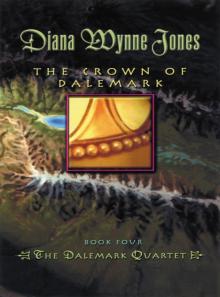 The Crown of Dalemark
The Crown of Dalemark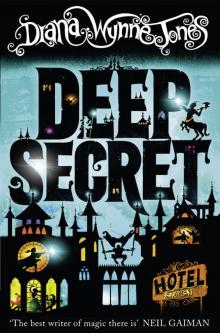 Deep Secret
Deep Secret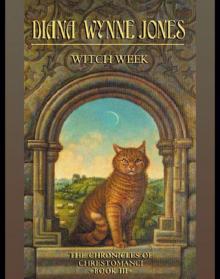 Witch Week
Witch Week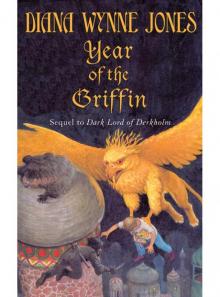 Year of the Griffin
Year of the Griffin Wild Robert
Wild Robert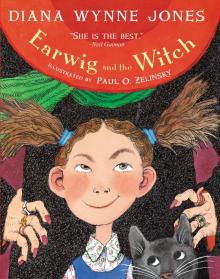 Earwig and the Witch
Earwig and the Witch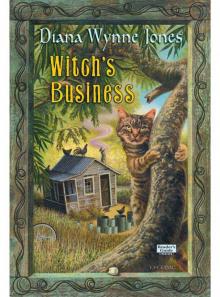 Witch's Business
Witch's Business Dogsbody
Dogsbody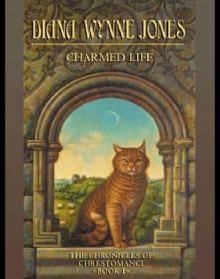 Caribbean Cruising
Caribbean Cruising Cart and Cwidder
Cart and Cwidder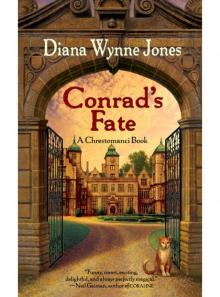 Conrad's Fate
Conrad's Fate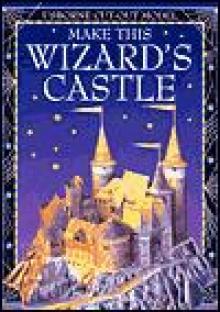 Howl's Moving Castle
Howl's Moving Castle The Spellcoats
The Spellcoats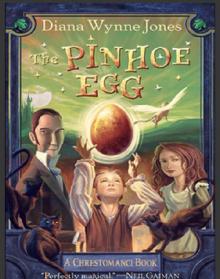 The Pinhoe Egg
The Pinhoe Egg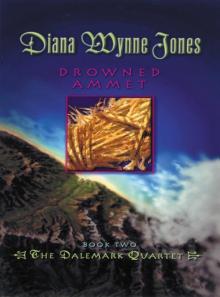 Drowned Ammet
Drowned Ammet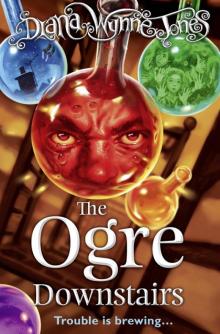 The Ogre Downstairs
The Ogre Downstairs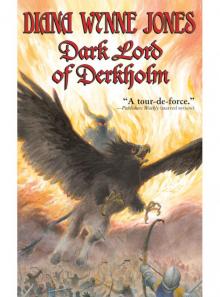 Dark Lord of Derkholm
Dark Lord of Derkholm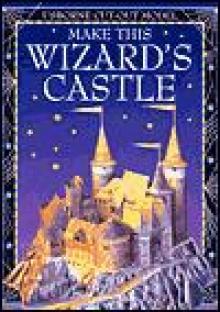 Castle in the Air
Castle in the Air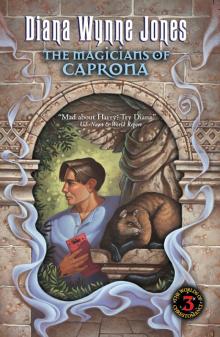 The Magicians of Caprona
The Magicians of Caprona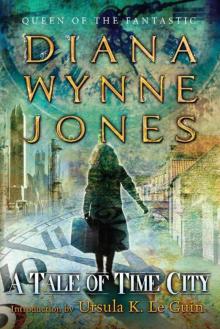 A Tale of Time City
A Tale of Time City The Lives of Christopher Chant
The Lives of Christopher Chant The Magicians of Caprona (UK)
The Magicians of Caprona (UK)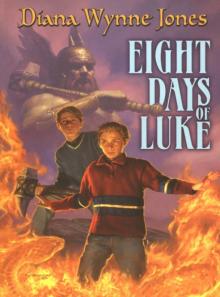 Eight Days of Luke
Eight Days of Luke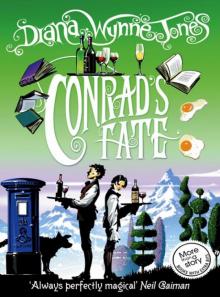 Conrad's Fate (UK)
Conrad's Fate (UK)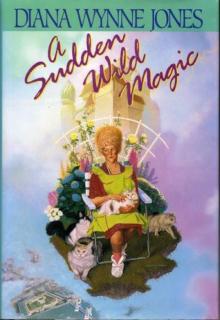 A Sudden Wild Magic
A Sudden Wild Magic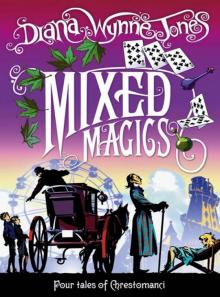 Mixed Magics (UK)
Mixed Magics (UK)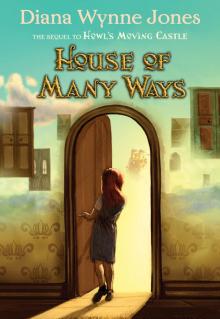 House of Many Ways
House of Many Ways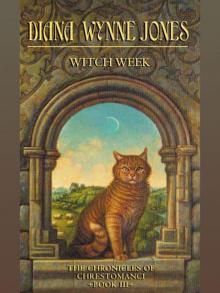 Witch Week (UK)
Witch Week (UK)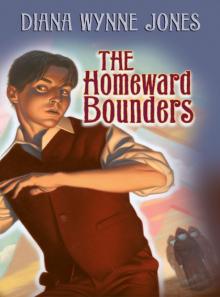 The Homeward Bounders
The Homeward Bounders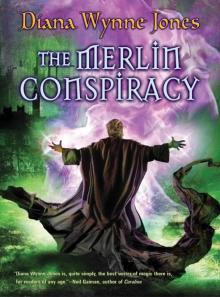 The Merlin Conspiracy
The Merlin Conspiracy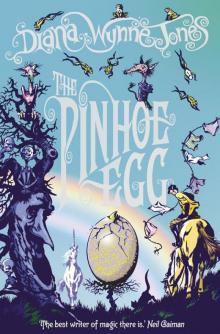 The Pinhoe Egg (UK)
The Pinhoe Egg (UK)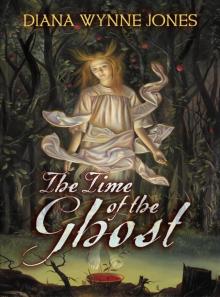 The Time of the Ghost
The Time of the Ghost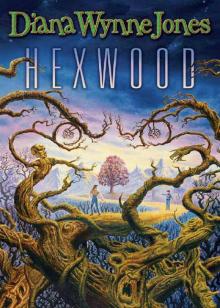 Hexwood
Hexwood Enchanted Glass
Enchanted Glass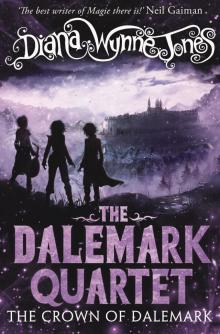 The Crown of Dalemark (UK)
The Crown of Dalemark (UK)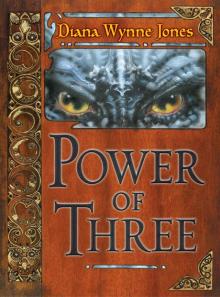 Power of Three
Power of Three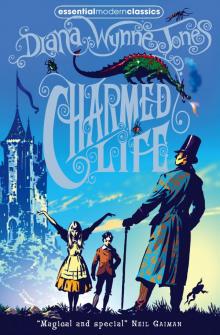 Charmed Life (UK)
Charmed Life (UK)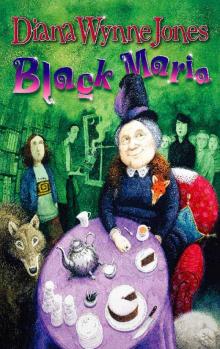 Black Maria
Black Maria The Islands of Chaldea
The Islands of Chaldea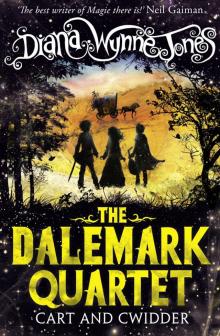 Cart and Cwidder (UK)
Cart and Cwidder (UK) Drowned Ammet (UK)
Drowned Ammet (UK)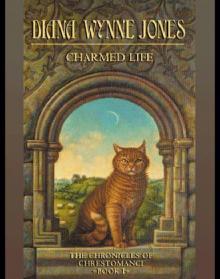 Charmed Life
Charmed Life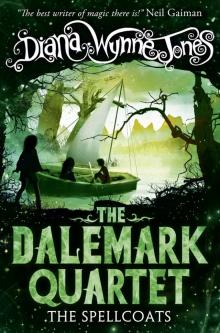 The Spellcoats (UK)
The Spellcoats (UK)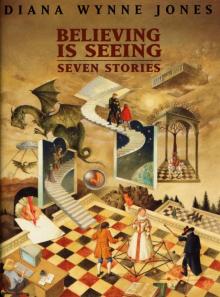 Believing Is Seeing
Believing Is Seeing Samantha's Diary
Samantha's Diary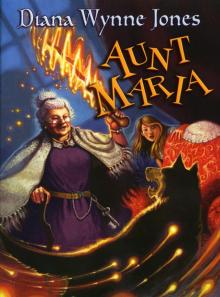 Aunt Maria
Aunt Maria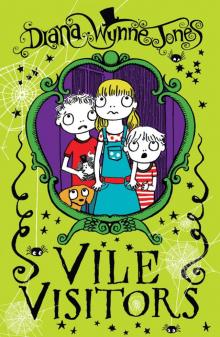 Vile Visitors
Vile Visitors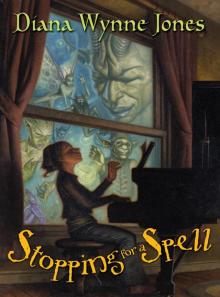 Stopping for a Spell
Stopping for a Spell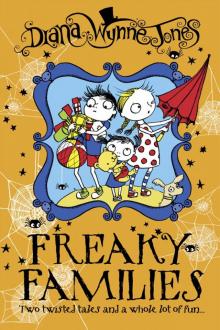 Freaky Families
Freaky Families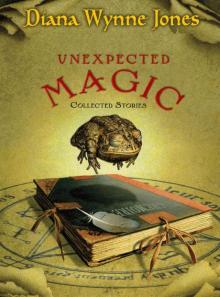 Unexpected Magic
Unexpected Magic Reflections
Reflections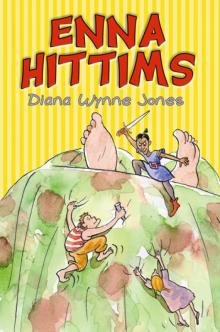 Enna Hittms
Enna Hittms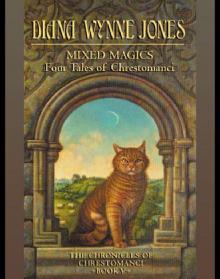 Mixed Magics: Four Tales of Chrestomanci
Mixed Magics: Four Tales of Chrestomanci